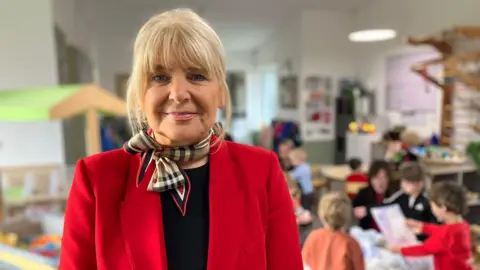Nurseries warn of rising fees ahead of child care expansion

 getty images
getty imagesNurseries say inadequate funding ahead of an expansion in free childcare provision could lead to parents facing higher fees and even nurseries closing.
On Tuesday, the government announced that early years funding in England will be increased by £2 billion next year to support Planned rollout of 30 hours per week Government-funded child care for all eligible children under five from September.
This includes a 45% increase in early years pupil premium funding for the most disadvantaged children, to £570 a year.
But nursery leaders have warned the rise will not be enough to cover National Insurance contributions and minimum wage staffing costs.
The £2 billion boost includes a £75 million expansion grant, which the government says will help nurseries, childminders and other providers to provide the 70,000 extra places needed from September.
But the National Day Nurseries Association (NDNA) says there will be additional costs minimum wage increased And National Insurance contributions could add £2,600 per employee to the average nursery outgoings next year, which would “cripple providers”.
The NDNA is warning that some nurseries will have to pass on these rising costs to parents in the form of higher fees.
And while it welcomes the increase in the early years pupil premium, the NDNA says £570 is still only a fraction of the £1,455 pupil premium paid to primary schools.
Nicola Fleury, owner of Kidzers, which has five settings in Salford, says she has seen a “huge increase in demand” for places since the transition to child care began.
 Vanessa Clark/BBC
Vanessa Clark/BBC“Our concerns are making sure our workers are paid fairly. An increase in the national minimum wage is absolutely right,” she says.
“They work very hard and are under a lot of pressure.”
But she says employers’ National Insurance contributions are going up “significantly”, and so nurseries “will have to get the money from somewhere”.
She wants to see business rates exempt for nurseries in England, in line with devolved policies in Wales and Scotland.
Mrs Fleury says her staffing costs will increase by between £8,000 and £10,000 a month from April.
The recruitment and retention crisis is also a major issue for the sector, which does not have enough workers to meet demand.
“The formative years are the most important years of a child’s life,” says Mrs. Fleury.
“We are making so many differences, not only for children, but for families as well. And it’s really important that as a profession we are recognized within the education system.”
 Vanessa Clark/BBC
Vanessa Clark/BBCAccording to the Department for Education, an extra 35,000 staff and 70,000 places will be needed to meet demand next September.
Education Secretary Bridget Phillipson says the early years “has been my priority from day one”.
“By giving more children the opportunity to be ready to go to school, we change their life chances and the life chances of every child in their class,” she says.
But there is also the regulator Ofsted raised concerns Many families struggle to access high-quality early child care.
And the declining availability of places is not spread evenly across the country, with the North East, East Midlands and Yorkshire and the Humber most affected.
Ofsted says these “childcare deserts” are more likely to occur in areas with low incomes and high child poverty.
The Department for Education says a 45% increase in the Early Years Pupil Premium will provide more support to families most likely to live in a childcare desert.
Nick Harrison, chief executive of the Sutton Trust, called it a “welcome first step” but said “much more is needed to level the playing field”.
 Vanessa Clark/BBC
Vanessa Clark/BBCGovernment-funded hourly rates for early years providers vary between local authorities.
On average, government funding rates for children under two will increase by 38p to £11.54, for two-year-olds by 28p to £8.53 and for three- and four-year-olds by 24p to £6.12.
Neil Leech, chief executive of the Early Years Alliance, says the new funding rates “will not even come close” to covering the costs.
“Countless nurseries, pre-schools and child-care providers will be left with no choice but to increase costs, reduce space or close their doors altogether,” he said.
NDNA chief executive Purnima Tanuku says a lack of funding could lead to higher nursery fees, as well as fewer available places during the government’s implementation of more funded childcare.
“All children deserve the best start in life and these rates do not reflect high-quality care and education,” she said.
“The combination of all these factors will be the last straw for some nurseries, resulting in more settings closing rather than expanding to meet expected demand.”
The NDNA says it has seen a 50% increase in the number of closures compared to last year, particularly in deprived areas.






